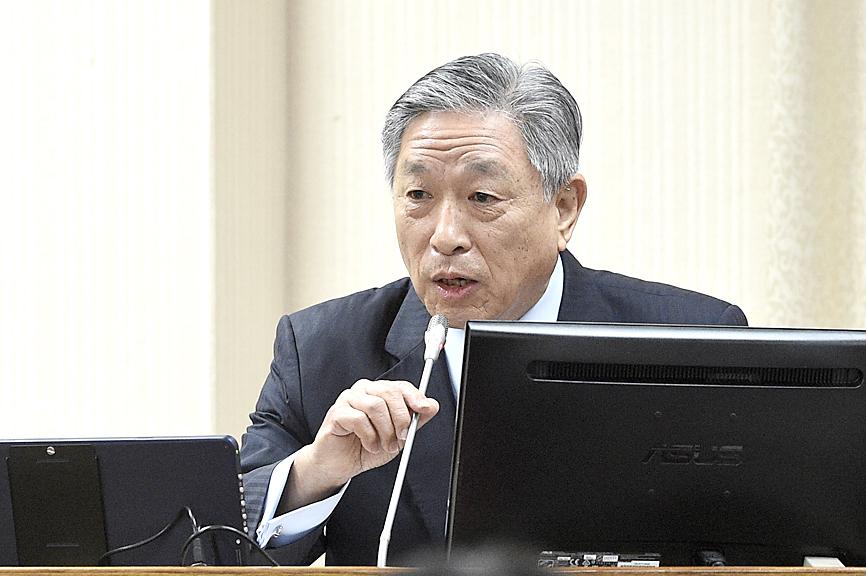Former Japanese prime minister Shinzo Abe might visit Taiwan next year, which the private sector highly anticipates and the government welcomes, Deputy Minister of Foreign Affairs Tien Chung-kwang (田中光) said yesterday.
Tien made the remarks in answering questions from legislators at a meeting of the Legislative Yuan’s Foreign Affairs and National Defense Committee.
Democratic Progressive Party (DPP) Legislator Kuo Kuo-wen (郭國文), chairman of a parliamentary friendship association for East Asia, on Tuesday said that Abe had accepted the association’s invitation to give a lecture at the Legislative Yuan next year.

Photo: George Tsorng, Taipei Times
In September, Abe — Japan’s longest-serving prime minister — stepped down due to health issues and was replaced by Yoshihide Suga.
Asked by other lawmakers to confirm Abe’s visit, Tien said that the government is positive about the plan and welcomes it, even though it has not received formal notice from Abe.
“We know the private sector is very much looking forward to it [Abe’s visit]. The government is also happy to see it happen,” Tien said.
Chinese Nationalist Party (KMT) Legislator Wen Yu-hsia (溫玉霞) asked if Abe’s visit might bring some “good news,” such as inviting Taiwan to join the Comprehensive and Progressive Agreement for Trans-Pacific Partnership (CPTPP).
A visit by Abe would mark a great improvement of bilateral relations, but Taiwan’s bid to join the trade bloc needs the consensus of all of the member states, Tien said.
Asked if Taiwan’s lifting of a ban on food imports from five Japanese prefectures after the 2011 Fukushima Dai-ichi nuclear power plant disaster would be a prerequisite for joining the trade bloc, Tien said that the government would ensure food safety, and follow international and scientific standards in handling the issue.
Wen and KMT Legislator Charles Chen (陳以信) asked why Representative to Japan Frank Hsieh (謝長廷) returned to Taiwan when Chinese Minister of Foreign Affairs Wang Yi (王毅) on Nov. 24 and 25 visited Tokyo and expressed Beijing’s intention to join the CPTPP.
Taking days off, Hsieh returned to Taiwan to attend two important meetings: a board meeting of the Taiwan-Japan Relations Association and a meeting of the Association of Taiwan Kotso Tai Rit Interchange, Tien said.
Hsieh’s attendance at the meetings was an “indirect” effort to facilitate Taiwan’s participation in the CPTPP, Tien said.
Hsieh might have fixed his itinerary before Wang confirmed his schedule, Tien said, rejecting KMT lawmakers’ accusations that the envoy was derelict in his duties.
Other diplomatic staff in Japan monitored Wang’s visit during Hsieh’s absence, Tien said, while agreeing to submit a report to lawmakers on Hsieh’s performance.
Hsieh wrote on Facebook on Sunday that he had returned to Tokyo on that day.

The Grand Hotel Taipei on Saturday confirmed that its information system had been illegally accessed and expressed its deepest apologies for the concern it has caused its customers, adding that the issue is being investigated by the Ministry of Justice Investigation Bureau. The hotel said that on Tuesday last week, it had discovered an external illegal intrusion into its information system. An initial digital forensic investigation confirmed that parts of the system had been accessed, it said, adding that the possibility that some customer data were stolen and leaked could not be ruled out. The actual scope and content of the affected data

DO THEY BITE IT? Cats have better memories than people might think, but their motivation is based entirely around the chance of getting fed Cats can remember the identity of the people who fed them the day before, Taipei-based veterinarians said on Friday, debunking a popular myth that cats have a short memory. If a stray does not recognize the person who fed them the previous day, it is likely because they are not carrying food and the cat has no reason to recognize them, said Wu Chou Animal Hospital head Chen Chen-huan (陳震寰). “When cats come to a human bearing food, it is coming for the food, not the person,” he said. “The food is the key.” Since the cat’s attention is on the food, it

A New York-based NGO has launched a global initiative to rename the nation’s overseas missions, most of which operate under the name "Taipei," to "Taiwan Representative Office (TRO)," according to a news release. Ming Chiang (江明信), CEO of Hello Taiwan, announced the campaign at a news conference in Berlin on Monday, coinciding with the World Forum held from Monday through Wednesday, the institution stated in the release. Speaking at the event, Democratic Progressive Party Legislator Huang Jie (黃捷) said she believed this renaming campaign would enable the international community to see Taiwan

TOO DANGEROUS: The families agreed to suspend crewed recovery efforts that could put rescuers in danger from volcanic gases and unstable terrain The bodies of two Taiwanese tourists and a Japanese pilot have been located inside a volcanic crater, Japanese authorities said yesterday, nearly a month after a sightseeing helicopter crashed during a flight over southwestern Japan. Drone footage taken at the site showed three bodies near the wreckage of the aircraft inside a crater on Mount Aso in Kumamoto Prefecture, police and fire officials said. The helicopter went missing on Jan. 20 and was later found on a steep slope inside the Nakadake No. 1 Crater, about 50m below the rim. Authorities said that conditions at the site made survival highly unlikely, and ruled